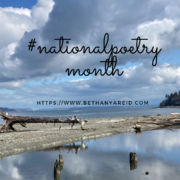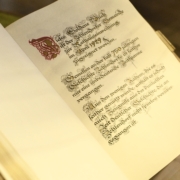Day 30: The Last Day
“Considering the ways in which so many of us waste our time, what would be wrong with a world in which everybody were writing poems? After all, there’s a significant service to humanity in spending time doing no harm. While you’re writing your poem, there’s one less scoundrel in the world. And I’d like a world, wouldn’t you, in which people actually took time to think about what they were saying? It would be, I’m certain, a more peaceful, more reasonable place. I don’t think there could ever be too many poets. By writing poetry, even those poems that fail and fail miserably, we honor and affirm life. We say ‘We loved the earth but could not stay.’”
― Ted Kooser, The Poetry Home Repair Manual: Practical Advice for Beginning Poets
*
from POETRYisEVERYTHING (abbreviated):
THE PROMPT for Wednesday April 30th, 2014
Prompt 30 – Something old, something borrowed, something blue — Our poem will be 8 to 12 lines. Every other line (lines 2, 4, 6 and 8 and possibly 10 and 12) will be brand new lines that you write. One or more of these lines will include something blue.
For lines 1, 3, 5, 7, and possibly, 9 and 11 use lines from two to three of the poems you have written in the last 30 days.
This is what I came up with (tinkered with it a little, losing the 2, 4, etc. organization):
*
Emma, Playing the Guitar
As a child I fell in love with words, pleats
and plaits, with words like implicate
which means braided into. Words
unfurling, an ocean that my streams ran to,
or out of, like my parents’ shelves of books,
my logger father reading aloud Emily Dickinson and Rudyard Kipling.
Tonight my youngest daughter practices her guitar,
in love with music, making me listen to a blue e-minor chord,
trellises of music like trellises of wisteria,
a wicker chair under a skylight, a scent
of gardenias and lilacs, the heavy bees thrumming.
Bout, fret, strings, saddle and bridge, soundhole, neck.
And her name, a word I’ve counted on
to make the world make sense.









 I am writing this post on my iPhone, an experiment. To explain, we spent the WHOLE day getting a DOG!!! A big deal for our family (the hold-out-Dad who has said no for 20 years, suddenly said fine). Our new dog, sort of a rescue, is a Tibetan Terrier named Pabu (Tibetan for Puffball, which I understand he was as a puppy; he’s bigger now), completely adorable (and really smart). I’m writing now as we cross home on the ferry. I’ll have more, no doubt, to tell you as this adventure unfolds.
I am writing this post on my iPhone, an experiment. To explain, we spent the WHOLE day getting a DOG!!! A big deal for our family (the hold-out-Dad who has said no for 20 years, suddenly said fine). Our new dog, sort of a rescue, is a Tibetan Terrier named Pabu (Tibetan for Puffball, which I understand he was as a puppy; he’s bigger now), completely adorable (and really smart). I’m writing now as we cross home on the ferry. I’ll have more, no doubt, to tell you as this adventure unfolds.